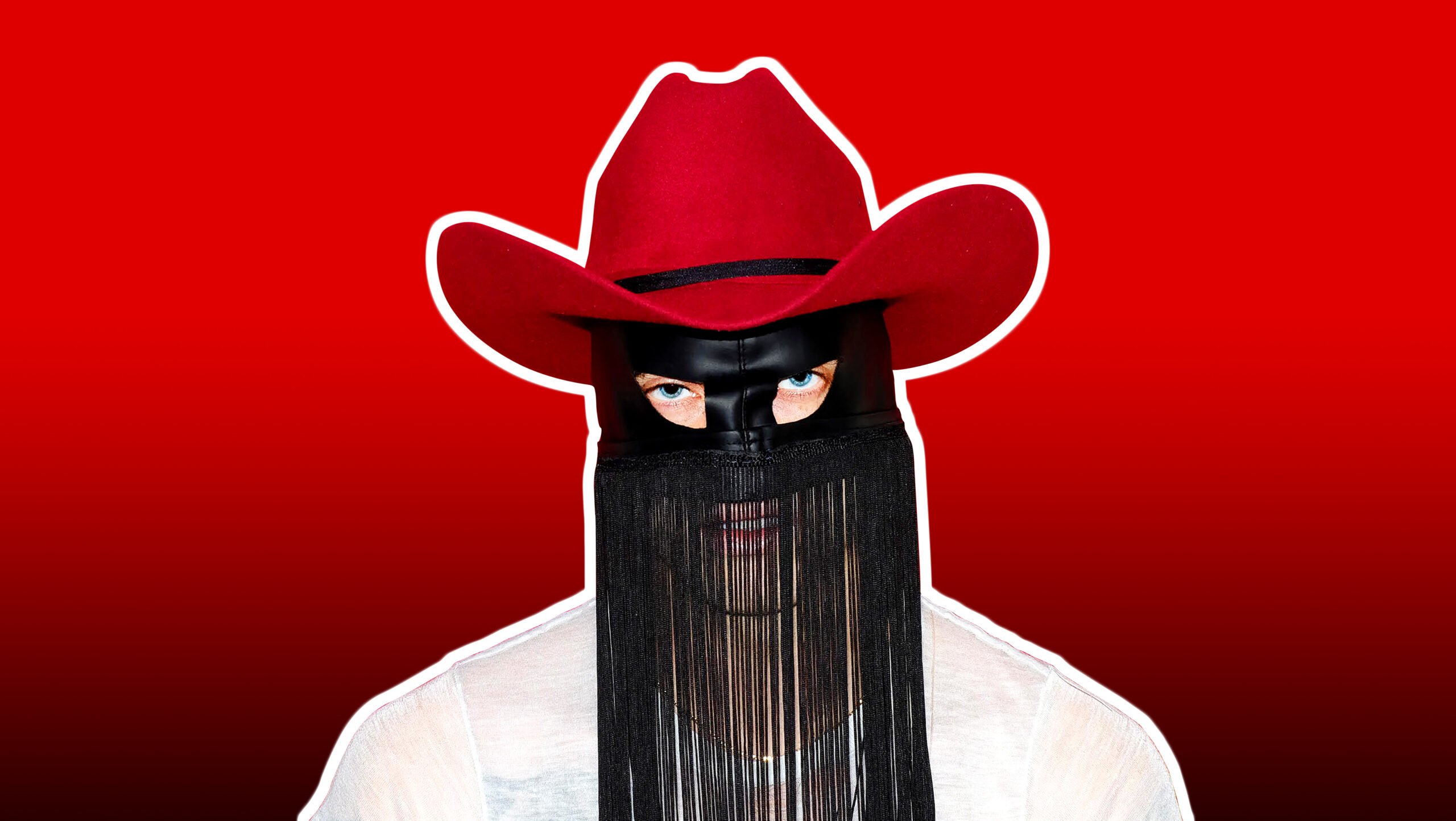One day Orville Peck woke up with a mask on his face, and he hasn’t been able to take it off since — or so the story goes. In the country musician’s world, the tales are tall and the fringe, hanging from his BDSM-reminiscent leather mask, is long, sometimes snaking all the way down his chest. Whether he’s wearing a western button-up shirt or a see-through mesh tank, the mask is there, denoting the artist’s outlaw status beneath a 10-gallon hat. On his debut album Pony, released earlier this year and longlisted for the Polaris Music Prize, Peck sings in a deep baritone with a steel- guitar-heavy sound that’s much more Hank Williams than Hank Williams Jr, and that’s dreamy enough to make your grandfather nostalgic. Unlike grandpa’s country tunes, though, Peck’s songs of heartbreak and riding through the desert unabashedly place other men as the object of his desire.
Orville Peck is the pseudonym of this Toronto-based musician who doesn’t talk about his age or where he was born. However, he does acknowledge that he used to play in punk bands and has a theatre and dance background. The latter might be obvious, given his tendency for fashionable drama and pageantry, both of which drew him to country music as a kid. Despite the association of cowboys with heterosexual, masculine ideals, Peck doesn’t see his queer identity as a departure for the genre. As he points out, our modern, archetypal image of the cowboy was partly influenced by the spaghetti westerns of the 1960s, made by Italian directors who wrote homoerotic subtext into their scripts. These are tales about men wandering the barren landscape together (and wearing a whole lot of leather); think Sergio Leone’s classic The Good, the Bad and the Ugly, and the lesser-known Requiescant by Carlo Lizzani.
Peck always related to the world of westerns in which marginalized outlaws were the central figure rather than ubiquitously popular leading men of the period like James Bond, who dominated the screen throughout the same decade. In the former stories, a mysterious solitary stranger rolls through town and ends up collecting a crowd of other outsiders to travel with. “That’s kind of my life story,” he says.
“Despite the association of cowboys with heterosexual, masculine ideals, Peck doesn’t see his queer identity as a departure for the genre.”
He filled Pony with the familiar themes of spaghetti westerns, like loneliness, heartbreak and the urge to escape, though he uses male pronouns throughout the album. On “Big Sky,” he sings about something he never thought he’d talk about publicly: domestic violence. The lyrics “I like him best when he’s not around […] Heartbreak is a warm sensation / When the only feeling that you know is fear” touch on abuse within relationships, a theme rarely taken up in country aside from songs like “Goodbye Earl” by the Dixie Chicks. He was only able to sing about this troubled relationship after he took time off from playing in punk bands, donned the mask and became Orville Peck; the hand-sewn piece of leather and fringe reveals more than it hides after all. Peck’s music videos bring his world into focus, showing him singing about lost love to a beautiful man in tight cutoff shorts or featuring casts that include queer and trans folks and people of colour. His message is clear: whether it’s in a desolate hotel room, a vast swath of desert or at a mechanical bull riding competition, all are welcome.
The diversity portrayed in his videos also speaks to the shifts slowly taking place in country music, a genre much more associated with heteronormative, conservative, white America than liberal inclusivity. Some contemporary acts are now taking a page from Willie Nelson, who released a cover of Ned Sublette’s “Cowboys are Frequently Secretly (Fond of Each Other)” back in 2006. In 2015, the Brothers Osborne included a male couple in the music video for “Stay a Little Longer,” while Kacey Musgraves, an outspoken supporter of the LGBTQ2 community, has said that she looks forward to a time when country would have it’s own gay figure to look up to. Maybe a masked cowboy who combines music, dance, visual art and fashion will fit the bill.

Though Peck refers to his all-encompassing act as a “project,” he doesn’t turn his nose up to not-so-new “new” country — some of his favourite artists include Garth Brooks, Tim McGraw and the aforementioned Dixie Chicks. According to Peck, these acts began the trend of tongue-in-cheek songs “about absolute nonsense [and] red solo cups.” Somewhere down the line, though, those tropes became the norm —they populate so many contemporary songs now that you can easily play pop-country bingo: Truck? Check. Whisky? Ditto. Sweet small-town girl? Bingo!
As the genre keeps gaining popularity both abroad and in North America thanks to a growing urban millennial audience, the question of who gets to make country music and what it should sound like is also evolving. Though there are plenty of Blake Shelton-types singing about drinking with the (hetero) boys ‘round here, there’s also Lil Nas X blurring the line between hip hop and country — while also facing plenty of backlash for it. A week after debuting on Billboard’s Hot Country Songs chart earlier this year, his hit “Old Town Road” was moved to their Hot Rap Songs chart, sparking fierce debates. Billboard’s justification that Lil Nas X’s hit didn’t embrace enough of contemporary country’s elements doesn’t hold water, considering that modern country music has been transforming the genre for the better part of a decade. Think of how Nelly’s remix of Florida Georgia Line’s 2012“Cruise” lived comfortably on the chart, though there’s little stereotypical country left on the track aside from the singer’s twang and the odd mention of farm towns.
“Though there are plenty of Blake Shelton-types singing about drinking with the (hetero) boys, there’s also Lil Nas X blurring the line between hip hop and country.”
Many critics of Billboard’s decision maintained that the removal of “Old Town Road” was actually about Lil Nas X being a young black man from Atlanta rather than him straying too far from genre norms. And when the artist came out as gay in July, he faced a new wave of outrage. In the end, though, the numbers speak for themselves: “Old Town Road” now holds the title of longest-running No. 1 single in Billboard’s history, proving that there’s room in the genre for those who aren’t white and straight.
As Peck puts it, there’s always been something subversive about outlaw country music, it’s just that what’s deemed subversive changes. In the 1950s and 60s, when the mainstream was all about ultra-conservatism, musicians like Johnny Cash and Merle Haggard were singing about prison and smoking weed. “That was their version of dramatic subversion,” Peck says. These day, the marginalized perspective “happens to be queer people, people of colour and women. Those voices have more of a place in country than anything.” As the old ways of being rebellious have become the genre’s tropes, artists like Peck are redefining the subversive space.
The masked cowboy has each foot planted in different worlds, which makes for diverse crowds at live shows. Older, die-hard country fans sway to his tunes alongside queer kids and punks. At a show in Montreal last April, he introduced his song “Queen of the Rodeo” by explaining that it was written about a drag queen friend, adding that he sometimes felt like a drag queen himself. The comparison was more of a philosophical one. He has the utmost respect for the amount of work and money that goes into drag and, though he makes his own masks (it takes him about 30 minutes to sew one), he also “[spends] far less on hair and makeup.” What he meant by the comparison is that people get a similar thing wrong about both him and drag queens: Audiences often think the performers are hiding behind a persona or a mask, but these roles are actually heightened versions of themselves — sometimes even better versions, Peck says.

Though his mask allows Peck to create a sense of intrigue and mystery, it also leads people to project themselves onto his work, which he says is the biggest compliment because it means they’re engaging with his music. The comment sections of his videos are filled with arguments about whether he sounds more like Elvis, Roy Orbison or Morrissey; everyone feels nostalgic for the sounds that are closest to their hearts. His music, both ambiguous and suggestive enough to host all of our memories, creates space for projections. The same can’t always be said for the specificity-driven songs played by many of country’s straight male sets, who are still working hard to uphold their status quo traditions. The song “Beer Never Broke My Heart” by Luke Combs doesn’t have quite the same evocative ring to it as Peck’s “Dead of Night” in which everything is oddly familiar to the narrator: strange canyon roads mirror the strange look in Peck’s lover’s eye, and scratches on the moon are reminiscent of past smiles. On the flip side, “It takes one hand to count the things I can count on / But I got one hand that’s gripping down on a cold one” has fewer blanks for our imaginations to fill in.
The genre still has plenty of work to do before it’s truly inclusive, and before blurring the lines doesn’t launch a Twitter storm. But once change shows its face (even one obscured by a mask), there’s no forgetting it. Artists like Peck are already creating myth-and-nostalgia-heavy worlds we want to get lost in, where there’s room for everybody to imagine themselves on horseback, reins in hand, following his gravelly voice off into the sunset.


 Why you can trust Xtra
Why you can trust Xtra


